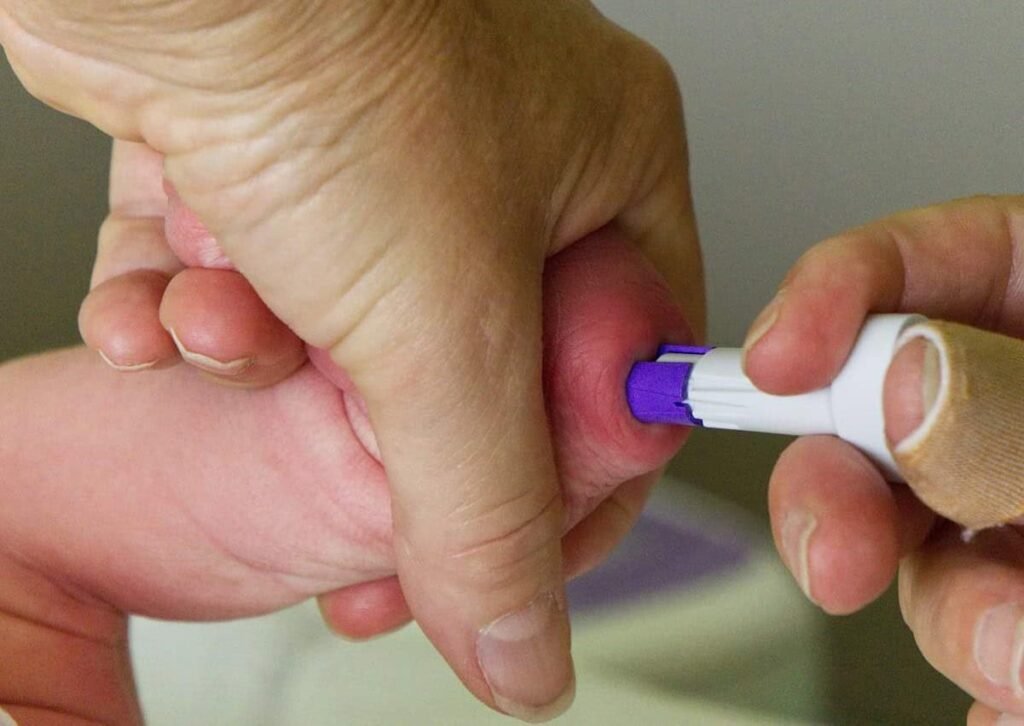The purpose behind a Newborn Screening Test is to detect, at a very early stage, the possibility of any rare disease(s) in a child. Testing all the diseases included in newborn screening can help in preventing any adverse medical condition in a baby from doing any irreversible damage to his/her growth and development.
Table of Contents
When is Newborn Screening Test Done?
Newborn screening test is done immediately after the baby’s birth, usually 24 to 48 hours of birth and before leaving the hospital. The process involves taking a tiny drop of blood from the baby’s heel, followed by a simple hearing test.
Sometimes, the baby may also need a second screening test on completing 2 weeks to ensure the results are accurate.
The sample is then sent to a lab where tests are performed and results are analysed. Though the sample can be tested for more than 30 disorders, the exact number depends on which part of the world you live.
The 13 Most Common Diseases Included in Newborn Screening Tests
- Tyrosinemia
- Galactosemia
- Toxoplasmosis
- MCAD Deficiency
- Sickle Cell Disease
- Hearing Screening
- Cystic Fibrosis (CF)
- Biotinidase Deficiency
- Phenylketonuria (PKU)
- Congenial Hypothyroidism
- Maple Syrup Urine Disease (MSUD)
- Congenial Adrenal Hyperplasia (CAH) Severe Combined Immunodeficiency (SCID)
4 Categories of Medical Conditions Tested in Newborn Screening
- Infectious Diseases: Testing for the presence of viruses that cause infection and other antibodies.
- Endocrine Disorders: Conditions which cause hormonal imbalances such as hyperthyroidism.
- Carbohydrate Disorders: Conditions such as lactose intolerance that affects the metabolism of carbohydrates.
- Haemoglobinopathies: Problems related to haemoglobin, which include disorders like Sickle Cell disease and Thalassemia, among others.
What Tests are Included in Newborn Screening?
Pulse Oximetry Testing: This test measures the oxygen level in a child’s blood and helps in identifying babies who have Critical Congenial Heart Disease (CCHD). The test is performed using a specialised machine, 24 hours after the birth of baby.
Blood Test: The test is also called as the “heel stick” test, as the blood sample is drawn by picking the baby’s heel. The sample collected is then placed on a filtered card that creates blood spots, which are sent for testing.
Hearing Screening Test: The hearing test are of 2 different types: (a) Otoacoustic Emissions Test (OET): This test is performed to determine whether the baby’s responses to sound are normal, and (b) Auditory Brain Stem Response (ABR): This test evaluates the nerves that carry sound to the brain and how the brain responds to sounds.
How to Prepare for Newborn Screening Test?
Newborn screening procedures are simple and do not require any special preparation. However, it is advised to nurse the baby before and/or after the procedure to ensure that he/she is comfortable and warm.
During the time of the blood test, parents may choose to hold and comfort the child while the sample is drawn out of the heel.
How to Interpret Newborn Screening Test Results?
Screening Test Result – Negative
A negative result means that all the parameters tested for the child are within the normal range and there is no increased risk. Follow-up testing is usually not necessary for a negative result.
Screening Test Result – Positive
A positive result signifies that at least one (or more) of the test parameters are not within the normal range. However, it may only be only an indicator of a potential abnormality. Therefore, further testing may be required to diagnose and confirm whether a problem indeed exists (or otherwise) and whether it requires immediate attention.
What if a Baby Doesn’t Undergo Screening?
Though, statistically speaking, there is a very small chance for a newborn having an adverse medical condition. However, not screening the baby could mean risking an adverse medical condition going unnoticed, which could result in abnormal growth or even premature death of a child.
Conclusion
Apart from the above diseases included in newborn screening, there are other diseases which can also be tested in the screening. While there are many countries where the tests are mandatory, there are countries where it is not.
That’s why many parents proactively choose the option of getting the newborn screening tests done as a precautionary measure. In a way, getting the test done also gives them peace of mind and focus on bringing up the child rather than regretting about not getting the test done on time.
Also Read : Visual Development in One Month Infants – Week-by-Week
Also Read : 7 Best Ways to Help Newborns Sleep Through the Night
Disclaimer: The content in this page and across this website are for informational and educational purposes only. In case of any concerns about your child’s growth and development, please contact your professional child healthcare provider.
